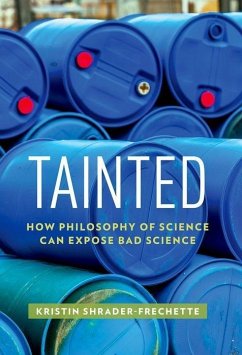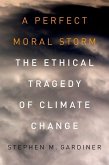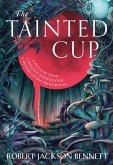Kristin Shrader-Frechette (O'Neill Family O'Neill Family Professor
Tainted
How Philosophy of Science Can Expose Bad Science
Kristin Shrader-Frechette (O'Neill Family O'Neill Family Professor
Tainted
How Philosophy of Science Can Expose Bad Science
- Broschiertes Buch
- Merkliste
- Auf die Merkliste
- Bewerten Bewerten
- Teilen
- Produkt teilen
- Produkterinnerung
- Produkterinnerung
This is the first book on practical philosophy of science and how to practically evaluate scientific findings that have life-and-death consequences. Showing how to uncover scores of scientific flaws typically used by special interests who try to justify their deadly pollution this book aims to liberate the many potential victims of environmentally-induced disease and death.
Andere Kunden interessierten sich auch für
![A Perfect Moral Storm A Perfect Moral Storm]() Stephen M. Gardiner (Associate Professor, Associate Professor, DepaA Perfect Moral Storm37,99 €
Stephen M. Gardiner (Associate Professor, Associate Professor, DepaA Perfect Moral Storm37,99 €![The Tainted Cup The Tainted Cup]() Robert Jackson BennettThe Tainted Cup16,99 €
Robert Jackson BennettThe Tainted Cup16,99 €![Empire of the Moghul: The Tainted Throne Empire of the Moghul: The Tainted Throne]() Alex RutherfordEmpire of the Moghul: The Tainted Throne13,99 €
Alex RutherfordEmpire of the Moghul: The Tainted Throne13,99 €![The Tainted Coin The Tainted Coin]() Mel StarrThe Tainted Coin14,99 €
Mel StarrThe Tainted Coin14,99 €![Tainted Lives Tainted Lives]() Mandasue HellerTainted Lives13,99 €
Mandasue HellerTainted Lives13,99 €![A Tainted Marriage A Tainted Marriage]() Julie RobertsA Tainted Marriage13,99 €
Julie RobertsA Tainted Marriage13,99 €![Tainted Too Tainted Too]() Blacc ToppTainted Too9,99 €
Blacc ToppTainted Too9,99 €-
-
-
This is the first book on practical philosophy of science and how to practically evaluate scientific findings that have life-and-death consequences. Showing how to uncover scores of scientific flaws typically used by special interests who try to justify their deadly pollution this book aims to liberate the many potential victims of environmentally-induced disease and death.
Hinweis: Dieser Artikel kann nur an eine deutsche Lieferadresse ausgeliefert werden.
Hinweis: Dieser Artikel kann nur an eine deutsche Lieferadresse ausgeliefert werden.
Produktdetails
- Produktdetails
- Environmental Ethics and Science Policy Series
- Verlag: Oxford University Press Inc
- Seitenzahl: 306
- Erscheinungstermin: 1. April 2016
- Englisch
- Abmessung: 234mm x 156mm x 18mm
- Gewicht: 452g
- ISBN-13: 9780190603816
- ISBN-10: 019060381X
- Artikelnr.: 47868884
- Herstellerkennzeichnung
- Produktsicherheitsverantwortliche/r
- Europaallee 1
- 36244 Bad Hersfeld
- gpsr@libri.de
- Environmental Ethics and Science Policy Series
- Verlag: Oxford University Press Inc
- Seitenzahl: 306
- Erscheinungstermin: 1. April 2016
- Englisch
- Abmessung: 234mm x 156mm x 18mm
- Gewicht: 452g
- ISBN-13: 9780190603816
- ISBN-10: 019060381X
- Artikelnr.: 47868884
- Herstellerkennzeichnung
- Produktsicherheitsverantwortliche/r
- Europaallee 1
- 36244 Bad Hersfeld
- gpsr@libri.de
Kristin Shrader-Frechette is O'Neill Professor at University of Notre Dame, where she teaches biological sciences, environmental sciences, and philosophy of science. With degrees in mathematics and in philosophy of science, she has done three post-docs -- in biology, economics, and hydrogeology -- and served on many boards/committees of the US National Academy of Sciences and international scientific or environmental groups. The first female president of 3 professional scientific associations, she has had her scientific research (on quantitative risk assessment in radiobiology, biostatistics, and energy modeling) funded for 27 years by the US National Science Foundation. Author of more than 400 articles and 16 books, including Taking Action, Saving Lives (2007, Oxford University), she writes for both scientific and medical journals. Her books and articles have been translated into 13 languages and also appear in popular newspapers and magazines. In 2004 Shrader-Frechette became only the third American to win the World Technology Award in Ethics. In 2007, she was named one of 12 "Heroes for the US and the World" because of her pro-bono environmental-justice (EJ) work with minority and poor communities. In 2011, Tufts University gave her the Jean Mayer Global Citizenship Award for her pro-bono public-health and EJ Work.
* Section 1: Conceptual and Logical Analysis
* Chapter 1: Speaking Truth to Power: Uncovering Flawed Methods,
Protecting Lives and Welfare
* Chapter 2: Discovering Dump Dangers: Unearthing Hazards in
Hydrogeology
* Chapter 3: Hormesis Harms: The Emperor Has No Biochemistry Clothes
* Chapter 4: Trading Lives for Money: Compensating Wage Differentials
in Economics
* Section 2: Heuristic Analysis and Developing Hypotheses
* Chapter 5: Learning from Analogy: Extrapolating from Animal Data in
Toxicology
* Chapter 6: Conjectures and Conflict: A Thought Experiment in Physics
* Chapter 7: Being a Disease Detective: Discovering Causes in
Epidemiology
* Chapter 8: Why Statistics Is Slippery: Easy Algorithms Fail in
Biology
* Section 3: Methodological Analysis and Justifying Hypotheses
* Chapter 9: Releasing Radioactivity: Hypothesis-Prediction in
Hydrogeology
* Chapter 10: Protecting Florida Panthers: Historical-Comparativist
Methods in Zoology
* Chapter 11: Cracking Case Studies: Why They Work in Sciences Such As
Ecology
* Chapter 12: Uncovering Cover-up: Inference to the Best Explanation in
Medicine
* Section 4: Values Analysis and Scientific Uncertainty
* Chapter 13: Value Judgments Can Kill: Expected-Utility Rules in
Decision Theory
* Chapter 14: Understanding Uncertainty: False Negatives in
Quantitative Risk Analysis
* Chapter 15: Where We Go from Here: Making Philosophy of Science
Practical
* Chapter 1: Speaking Truth to Power: Uncovering Flawed Methods,
Protecting Lives and Welfare
* Chapter 2: Discovering Dump Dangers: Unearthing Hazards in
Hydrogeology
* Chapter 3: Hormesis Harms: The Emperor Has No Biochemistry Clothes
* Chapter 4: Trading Lives for Money: Compensating Wage Differentials
in Economics
* Section 2: Heuristic Analysis and Developing Hypotheses
* Chapter 5: Learning from Analogy: Extrapolating from Animal Data in
Toxicology
* Chapter 6: Conjectures and Conflict: A Thought Experiment in Physics
* Chapter 7: Being a Disease Detective: Discovering Causes in
Epidemiology
* Chapter 8: Why Statistics Is Slippery: Easy Algorithms Fail in
Biology
* Section 3: Methodological Analysis and Justifying Hypotheses
* Chapter 9: Releasing Radioactivity: Hypothesis-Prediction in
Hydrogeology
* Chapter 10: Protecting Florida Panthers: Historical-Comparativist
Methods in Zoology
* Chapter 11: Cracking Case Studies: Why They Work in Sciences Such As
Ecology
* Chapter 12: Uncovering Cover-up: Inference to the Best Explanation in
Medicine
* Section 4: Values Analysis and Scientific Uncertainty
* Chapter 13: Value Judgments Can Kill: Expected-Utility Rules in
Decision Theory
* Chapter 14: Understanding Uncertainty: False Negatives in
Quantitative Risk Analysis
* Chapter 15: Where We Go from Here: Making Philosophy of Science
Practical
* Section 1: Conceptual and Logical Analysis
* Chapter 1: Speaking Truth to Power: Uncovering Flawed Methods,
Protecting Lives and Welfare
* Chapter 2: Discovering Dump Dangers: Unearthing Hazards in
Hydrogeology
* Chapter 3: Hormesis Harms: The Emperor Has No Biochemistry Clothes
* Chapter 4: Trading Lives for Money: Compensating Wage Differentials
in Economics
* Section 2: Heuristic Analysis and Developing Hypotheses
* Chapter 5: Learning from Analogy: Extrapolating from Animal Data in
Toxicology
* Chapter 6: Conjectures and Conflict: A Thought Experiment in Physics
* Chapter 7: Being a Disease Detective: Discovering Causes in
Epidemiology
* Chapter 8: Why Statistics Is Slippery: Easy Algorithms Fail in
Biology
* Section 3: Methodological Analysis and Justifying Hypotheses
* Chapter 9: Releasing Radioactivity: Hypothesis-Prediction in
Hydrogeology
* Chapter 10: Protecting Florida Panthers: Historical-Comparativist
Methods in Zoology
* Chapter 11: Cracking Case Studies: Why They Work in Sciences Such As
Ecology
* Chapter 12: Uncovering Cover-up: Inference to the Best Explanation in
Medicine
* Section 4: Values Analysis and Scientific Uncertainty
* Chapter 13: Value Judgments Can Kill: Expected-Utility Rules in
Decision Theory
* Chapter 14: Understanding Uncertainty: False Negatives in
Quantitative Risk Analysis
* Chapter 15: Where We Go from Here: Making Philosophy of Science
Practical
* Chapter 1: Speaking Truth to Power: Uncovering Flawed Methods,
Protecting Lives and Welfare
* Chapter 2: Discovering Dump Dangers: Unearthing Hazards in
Hydrogeology
* Chapter 3: Hormesis Harms: The Emperor Has No Biochemistry Clothes
* Chapter 4: Trading Lives for Money: Compensating Wage Differentials
in Economics
* Section 2: Heuristic Analysis and Developing Hypotheses
* Chapter 5: Learning from Analogy: Extrapolating from Animal Data in
Toxicology
* Chapter 6: Conjectures and Conflict: A Thought Experiment in Physics
* Chapter 7: Being a Disease Detective: Discovering Causes in
Epidemiology
* Chapter 8: Why Statistics Is Slippery: Easy Algorithms Fail in
Biology
* Section 3: Methodological Analysis and Justifying Hypotheses
* Chapter 9: Releasing Radioactivity: Hypothesis-Prediction in
Hydrogeology
* Chapter 10: Protecting Florida Panthers: Historical-Comparativist
Methods in Zoology
* Chapter 11: Cracking Case Studies: Why They Work in Sciences Such As
Ecology
* Chapter 12: Uncovering Cover-up: Inference to the Best Explanation in
Medicine
* Section 4: Values Analysis and Scientific Uncertainty
* Chapter 13: Value Judgments Can Kill: Expected-Utility Rules in
Decision Theory
* Chapter 14: Understanding Uncertainty: False Negatives in
Quantitative Risk Analysis
* Chapter 15: Where We Go from Here: Making Philosophy of Science
Practical








